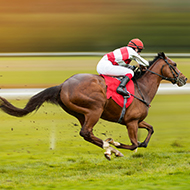Collaboration uses magnetic resonance imaging in racehorse heath study

The research was funded by the Horseracing Betting Levy Board.
Equine health specialists at the University of Edinburgh Royal (Dick) School of Veterinary Studies have collaborated with imaging teams from the University's Medical College to develop a non-invasive approach to study fibres in the hearts of horses, as reported by the School here.
The Dick Vet's equine cardiologists combined forces with imaging experts to evaluate the patterns of small fibres in the left atrium of the equine heart, in order to use the information to develop techniques to identify electrical activity in the heart.
This team then used scanning technologies diffusion tensor MR and micro CT in order to create detailed images of post-mortem specimens from horses, and both of these techniques created a strong visualisation of fibre tracts inside a horses heart.
Further separate projects have been undertaken by Edinburgh Imagine, collaborating with equine orthopaedic specialists at the Dick Vet on imaging the thoroughbred fetlock in racing horses.



 The RCVS has announced a new version of its 1CPD mobile app, with enhanced features for veterinary surgeons and veterinary nurses to record their continuing professional development.
The RCVS has announced a new version of its 1CPD mobile app, with enhanced features for veterinary surgeons and veterinary nurses to record their continuing professional development.